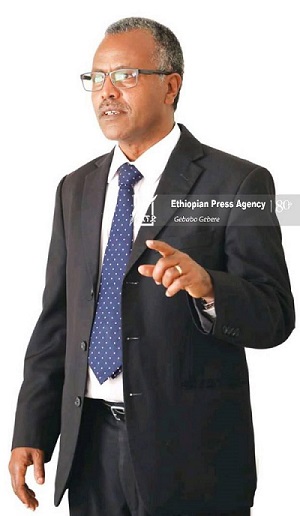
BY DESTA HELISO (PhD)
Ethiopia’s Election 2021 is due to be held on June 20. This highly anticipated election has been hoped to serve as a cornerstone for democracy and political stability. In this article, I would like to briefly discuss elections in Ethiopia since the Imperial regime to the current one.
The Imperial Era
For centuries, Ethiopia was ruled by a hereditary monarchic system that claimed its connection to Biblical Solomon. Such a claim was based on the story of the Queen of Sheba in 1 Kings 10, which is further developed by a document called Kebre-Negest (‘The Glory of Kings’), which was first produced in Coptic probably in 6th century AD and then translated into Arabic and Ge’ez (with some embellishments) in 14th century AD. In the Ge’ez version, the document compares the emperor of Rome with the emperor of Ethiopia. Both are sons of Solomon, but the emperor of Ethiopia was the first-born, whom the Queen bore to Solomon and who was appointed by God to reign in his earthly kingdom, the new Zion (Ethiopia).
The document presents the new king of the New Zion as someone who plays the twin role of political leadership to bring order and cohesion into a lawless and fragmented nation and religious leadership to destroy paganism, spread Christianity and defend Orthodox Christian faith. Almost all Ethiopian emperors appealed to this “biblical” imperial past in order to legitimate their authority. They were, therefore, seen as part of the Solomonic dynasty, elects of God and replicas of the Heavenly King in the earthly kingdom of God.
That was precisely why Haile Selassie (1930-1974), the last Emperor of Ethiopia, bore such a long title: The Conquering Lion of the Tribe of Judah, His Imperial Majesty Haile Selassie I, King of Kings of Ethiopia, Elect of God. But Emperor Haile Selassie was the first to introduce a system of election in Ethiopia.
The Constitution of Ethiopia, which was revised in 1955 under his oversight, provided for three crucial things: an elected chamber, a chamber of deputies appointed by the Emperor (the Senate) and an independent judiciary. It also provided for a ministerial government that was responsible to the monarch and parliament.
The power of the parliament made up of popularly elected representatives was balanced by the power of the Senate made up of the nobility and wealthy landlords. The Emperor was the head of state and government. He was also the head of the Ethiopian Orthodox Tewahedo Church. In addition to all this, he oversaw the judiciary through his Crown Court. In his attempt to manage the inevitable competitions and political intrigues amongst these groups, Haile Selassie rendered himself ineffective.
When the system failed to work, oppression and injustice increased, and discontent grew in all quarters, Haile Selassie attempted to decentralize and delegate power. But it was too little, too late, and the inevitable revolution led by the army and student movements broke out in 1974. This brought Haile-Selassie’s 44 years’ rule and the Ethiopian monarchy, along with its biblical claims, to an end. It also brought all the hopes of democratic processes to an end, as Marxism-Leninism became the guiding political principle of the country.
From Dergue to EPRDF
During the era of the Marxist-Leninist regime led by the Ethiopian Workers Party popularly known as the Dergue, representatives for the National Shengo were elected. But election in those days was not the process through which people expressed their will. The country was under a single party system.
The Ethiopian Workers Party predetermined who should represent a given constituency. Names and pictures of candidates appeared in towns and villages. People were told to cast their votes on the election day and the “elected” candidates were declared. The whole operation was so undemocratic and utterly nonsensical. It was an insult to people’s intelligence. People then gradually but quietly turned their backs on the regime, which hastened its demise.
After the end of the Dergue era in 1991, the EPRDF introduced a multi-party system. The first contested parliamentary and regional council elections took place in 2000. When the EPRDF encountered stiff opposition in some areas and realized that it was going to lose control, it sent in security forces to intimidate opposition supporters and their candidates.
That inevitably created unrest and engendered resentment amongst the populace. Many opposition leaders were jailed with no credible charges against them. The EPRDF was declared the winner, but much of what happened, by and large, was utterly inconsistent with the spirit of democracy.
The 2005 election was different from the one in 2000, as it was highly contested and, by and large, reflected the main ingredients in democratic elections. The EPRDF was declared the winner but opposition parties accused the EPRDF of rigging the election and the EPRDF accused opposition parties of the same.
The National Electoral Board was accused by the opposition of bias in the ways in which it handled the complaints and conducted the investigations. When the investigations were concluded, the opposition parties had won not less than 200 parliamentary seats.
The problem arose when the main opposition party – Coalition for Unity Democracy (CUD [Kinijit])– refused to accept the result. The CUD had legitimate policies relating to land rights, ethnic rights, national unity, electoral system, independence of the legislature and judiciary, etc. But some elements, particularly amongst the diaspora Ethiopians, who had directly or indirectly influenced the party, believed that although the opposition parties should be involved in the national elections, what they must focus on should be the process of the elections rather than the results. This, in their view, would make it possible for the opposition to claim that the elections were rigged and fraudulent and then instigate popular struggle, which would eventually bring down the EPRDF government.
The CUD then claimed that it won the polls, boycotted the parliament and refused to assume the administration of the city of Addis Ababa, where it had enjoyed a landslide victory. The party leadership decided to choose such a path claiming, rather incredibly, that the people urged them to do so. The CUD then encouraged the people to protest against the poll results. In November 2005, protesters took to the streets of Addis Ababa, blocked the roads and burned tires, and then engaged in confrontation with the police and security forces with ugly outcomes.
Over 200 people were reported dead, and many were injured. Opposition leaders of the CUD, civil society workers and journalists were incarcerated. Treason and genocide charges were brought against them. Of course, both the grounds for jailing and the charges brought against them were politically motivated. Mounting pressure from Ethiopians and the international community forced Meles Zenawi’s government to release the opposition politicians.
Squandered opportunities and lessons
In 2005, opportunities, albeit limited, to use political processes to bring about change were squandered. Had the CUD taken the parliamentary seats and assumed the administration of Addis Ababa, the political landscape of the country would have changed significantly. As a result of the historic mistakes made in 2005 by both the ruling party and the CUD in particular, almost all the outcomes of the democratization efforts in the preceding years were wiped out.
The EPRDF became much more repressive than before. Subsequent elections in 2010 and 2015 were not free, fair or transparent. While the opposition won one seat in the 2010 election, the EPRDF claimed to have won all parliamentary seats in the 2015 election. But both elections were hugely rigged, and therefore, many struggled to view the parliament and the executive branch as legitimate. Again the people of Ethiopia turned their backs on the EPRDF, which finally brought its demise after 27 years of rule.
One lesson we can learn from the last 90 years is that while a government that uses and abuses people, treats people with contempt and attempts to hang onto power through corrupt and illegitimate means or repressive policies may survive for 17, 27 or 44 years, its eventual demise is certain. Another lesson is that we should accept even in some testing circumstances that tolerance of dissenting views is a hallmark of democracy, while maintaining firmness in matters of principles and ensuring that freedom is subject to the rule of law.
Furthermore, from the ways in which the Monarchy, Dergue and EPRDF ended, future governments should learn that there is no better way than respecting the freedom of the will of the people rather than suppressing it. Nor is there any better way than fighting any political cause through peaceful, parliamentary and democratic means. As Winston Churchill said in his speech in 1947: “Many forms of government have been tried, and will be tried in this world of sin and woe.
No one pretends that democracy is perfect or all-wise. Indeed, it has been said that democracy is the worst form of government except for all those other forms that have been tried from time to time.” Democracy has limitations, but it is not optional for Ethiopia. And our hope is that all its characteristics, namely elected representatives; free, fair and frequent elections; freedom of expression; autonomous associations; inclusive citizenship; and access to alternative, independent sources of information, will become a culture.
Present and future elections
Ethiopia will hold its national elections after five days. I am painfully aware that Ethiopia’s deep-seated problems are not going to be solved by one peaceful and democratic election or even two elections. Barak Obama says in his memoir, A Promised Land, that “no single election will settle” all the complex racial and economic issues in the U.S. Given that the U.S. is the biggest exporter of democracy to the world, it is going to take many elections to address Ethiopia’s complex ethnic, political and economic issues. I believe, however, that Ethiopians currently have an opportunity despite the COVID-19 pandemic and worrying political and security developments in recent months. There exist dozens of active political parties with complex political fault lines.
For example, first, there are separatist forces within Oromia, who, through a strong support by Oromo diaspora groups, wish to create a separate state of Oromia. Second, there are political forces who wish to defend the current emphasis on ethnic-based administrative arrangements and maintain the existing constitutional provision, where regional states are sovereign and Ethiopia’s sovereignty depends on the will of those sovereign regional states. Third, there are still others, who advocate the principle of citizenship and national sovereignty, and want to reverse the constitutional provision for ethnic federalism and replace it with a federalist system that is arranged along ethnic lines.
Fourth, there are political forces who seek to maintain the current ethno-federalist political arrangements while putting a strong emphasis on the integrity of Ethiopia as a nation-state and the constitutional emphasis on strengthening the unity of nations, nationalities and peoples of Ethiopia as a single economic and political community. As Ethiopians go into the 2021 elections, these political fault lines will face them. I hope that many of the parties will focus on urgently pressing issues facing Ethiopia rather than appealing to ethnic loyalties.
Ethnic psychology is a fact of life. Ethnic loyalties run deeply in human beings and it is wrong to simply disavow ethnic reality. But transformed political leaders accept that ethnic loyalties take second place to a more fundamental understanding of being human.
They submit to values and standards of conduct, where ethnic identity and all other identities are shaped and guided by our common humanity, which transcends all other identities. They keep the balance between individual rights and responsibilities and communal and relational rights and responsibilities. This keeps them from privileging ethnic loyalties over against shared identity and national unity and vice versa.
This means that transformed political leaders will be committed to Ethiopian-ness and treat Ethiopia as one sovereign nation-state of diverse people groups. Ethiopian-ness is a unifying story that is shared by more than 80 people groups who have happened or chosen to live on a piece of land and share God-given resources together. These groups also voluntarily share common values, common cultural heritage and expressions and uniting symbols.
The vast majority of them have come to recognize and love this country called Ethiopia. What they actually love is not only that geographically determined land or incorporeal and intangible political construct called Ethiopia. What they love are those women and men whose lives and historical destinies are tied up with that of a political and geographical state called Ethiopia.
Shared narrative has resulted in shared identity. Political leaders who are unable to accept this reality cannot bring about fairness, justice and peace in Ethiopia. They may even destroy both the unity of diverse people groups and the diversity of united people groups.
Desta Heliso (PhD) served as a director and lecturer of the Ethiopian Graduate School of Theology (EGST). He had studied at King’s College London and London School of Theology. He currently resides in London but continues to coordinate the Centre for Ancient Christianity and Ethiopian Studies at EGST in Addis Ababa. He is also a fellow of the Center for Early African Christianity (New Haven) and a visiting lecturer at the London School of Theology (London). He recently authored a new book, Hope for Ethiopia. This piece has been extracted from this book where he discusses in detail why and how hopes for Ethiopia lie with Ethiopians.
The Ethiopian Herald June 16/2021



